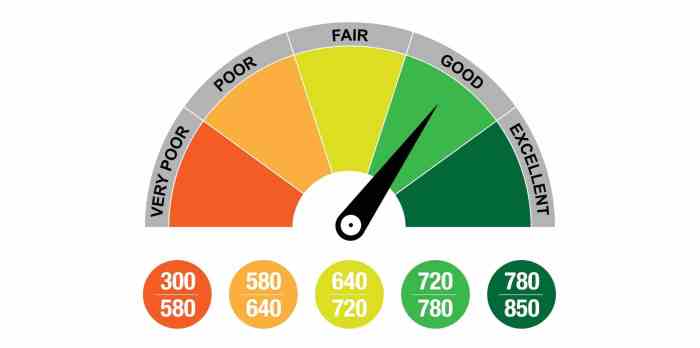Credit Score Improvement: Boosting Your Financial Health sets the stage for a cool exploration into the world of credit scores, offering valuable insights and tips to enhance your financial standing.
Get ready to dive into the strategies and tools that can help you elevate your credit score to new heights.
Understanding Credit Scores

Having a good credit score is crucial for your financial health. It is a three-digit number that represents your creditworthiness and helps lenders determine how likely you are to repay your debts. Here’s how credit scores are calculated and what factors can impact them positively or negatively.
Factors Affecting Credit Scores
- Payment history: Making on-time payments on your credit accounts can boost your credit score.
- Credit utilization: Keeping your credit card balances low in relation to your credit limit shows responsible credit management.
- Length of credit history: A longer credit history can demonstrate your ability to manage credit over time.
- Types of credit: Having a mix of credit accounts, such as credit cards and loans, can show that you can handle different types of debt.
- New credit inquiries: Opening multiple new credit accounts in a short period can negatively impact your credit score.
Strategies for Credit Score Improvement
Improving your credit score is essential for financial stability and access to better loan terms. By following these strategies, you can boost your credit score effectively.
Pay Bills on Time
One of the most crucial factors affecting your credit score is your payment history. Make sure to pay all your bills on time to avoid late payments, which can significantly impact your credit score.
Reduce Credit Card Balances
High credit card balances can negatively affect your credit utilization ratio, which is an important factor in calculating your credit score. Try to reduce your credit card balances to below 30% of your credit limit to improve your credit score.
Monitoring and Managing Credit Scores: Credit Score Improvement
Regularly keeping an eye on your credit score is crucial as it gives you a snapshot of your financial health and allows you to catch any errors or fraudulent activity early on.
Tools and Resources for Checking Credit Scores
- AnnualCreditReport.com: This website allows you to access a free credit report from each of the three major credit bureaus once a year.
- Credit Karma: A free service that provides access to your credit scores and reports from two major credit bureaus, Equifax and TransUnion.
- MyFICO: Offers credit monitoring services and access to your FICO credit scores, which are commonly used by lenders.
Strategies for Managing Credit Scores Effectively
- Pay your bills on time: Late payments can have a significant negative impact on your credit score.
- Keep credit card balances low: High credit card balances relative to your credit limits can lower your credit score.
- Avoid opening too many new accounts: Opening multiple new credit accounts within a short period can lower your average account age and hurt your credit score.
- Regularly review your credit report: Look for any errors or unauthorized accounts that could be dragging down your score.
- Consider using credit monitoring services: These services can alert you to any changes in your credit report, helping you catch and address issues promptly.
Rebuilding Credit Scores After Negative Impacts

After facing financial setbacks that have negatively impacted your credit score, it’s crucial to take proactive steps to rebuild and improve your credit history. By implementing effective strategies and managing your debts wisely, you can work towards restoring your credit score over time.
Steps for Rebuilding a Credit Score
- Start by obtaining a copy of your credit report to fully understand the extent of the damage.
- Create a realistic budget to manage your finances and prioritize paying off outstanding debts.
- Contact creditors to negotiate payment plans or settlements to address overdue accounts.
- Consider applying for a secured credit card to demonstrate responsible credit usage and build positive payment history.
Strategies for Dealing with Debt and Improving Credit History, Credit Score Improvement
- Avoid accruing additional debt and focus on reducing existing balances to lower your credit utilization ratio.
- Make timely payments on all bills and debts to showcase reliability and commitment to improving your credit score.
- Seek credit counseling or financial education resources to gain insights on managing debt effectively.
- Consider debt consolidation or debt settlement options to streamline payments and reduce overall debt burden.
Timeline for Credit Score Recovery
Rebuilding a credit score after negative impacts is a gradual process that can take several months to years, depending on the severity of the setback. Consistently practicing good financial habits and staying committed to improving your credit history will contribute to a steady increase in your credit score over time.